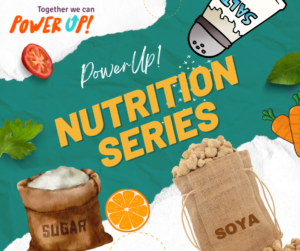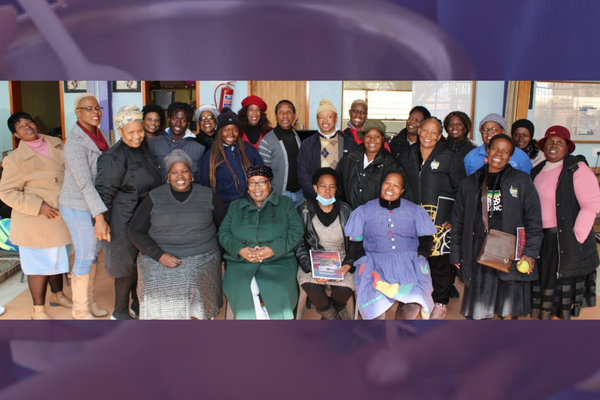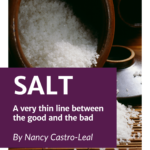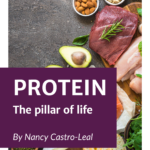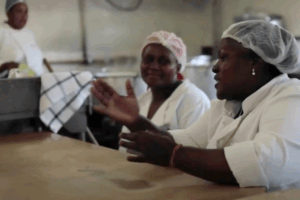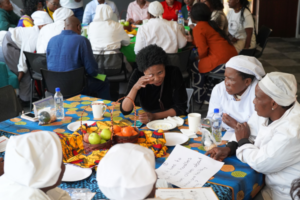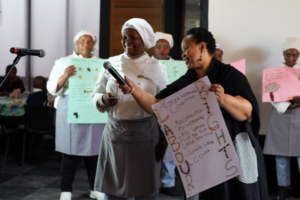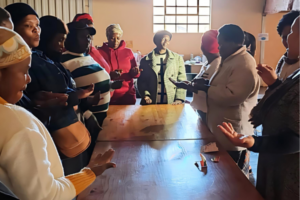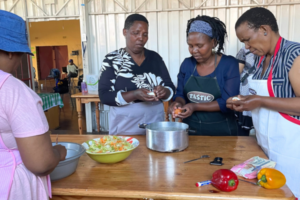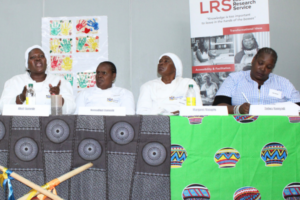Volunteer food handlers are critical to the successful implementation of the National School Nutrition Programme (NSNP). Yet, little is known about them and their role in the programme, society, and children’s nutrition. Usually, volunteer food handlers are community members whose own children attend the schools in which they cook daily. They are often labelled as unskilled volunteers who could benefit from training in better cooking practices. At a recent dialogue held at Rena Le Lona Creative Centre for Children in Diepkloof, Soweto, community stakeholders had a discussion about volunteer food handlers and their perceived role in society.
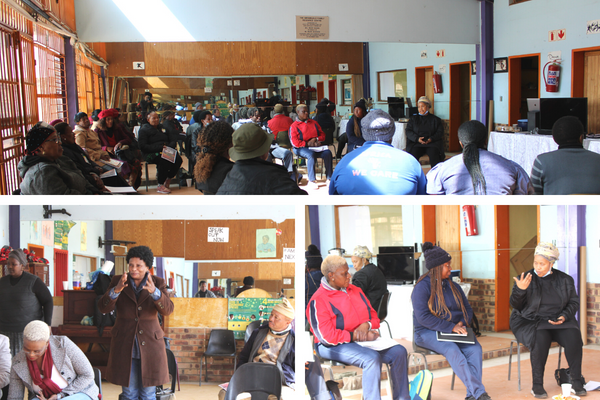
The dialogue was attended by various community stakeholders, including women community leaders, NGO members, retired school teachers, School Governing Body members, political party branch members, and food handlers from other feeding programmes. The community stakeholders shared a mutual appreciation of the NSNP, healthy nutrition, and traditional food. Initially, their view of the volunteer food handler role in the school nutrition programme was mainly informed by negative stereotypes. Upon engagement, however, the stakeholders reflected on positive aspects of the NSNP, including its focus on healthy nutrition and the pivotal role that volunteer food handlers play in carrying it out.
At the dialogue, community stakeholders had an idea of who volunteer food handlers are. However, they had a limited understanding of food handlers, their relationship with the NSNP, and the scope of their work. Those with children of school-going age were familiar with the programme and the type of food school children ate daily. However, their knowledge of volunteer food handlers was mainly informed by negative stereotypes ranging between alleged limited food preparation skills, lack of training and the prevalence of carelessness, neglect and theft amongst food handlers. Many stakeholders held the view that volunteer food handlers serve inedible and unappetising food to children. They attributed this to general negligence and disregard for the food preparation process, while others attributed the “bad” food to the lack of training at the onboarding stage of volunteer food handlers.
The stakeholders knew that most volunteer food handlers were women and mainly referred to them as “abomama abaphekayo” (women who cook/mothers who cook). Volunteer food handlers are mothers to children who attend the same schools where they are employed to cook, making them an active and visible part of each community. Because volunteer food handlers are seen as “mothers”, they are expected to fulfil a motherly role and intuitively cook “good” food. One stakeholder expressed that “when they cook for themselves, the food is good, but the food they cook for our children is bad”, while another added that “they don’t cook with love”.
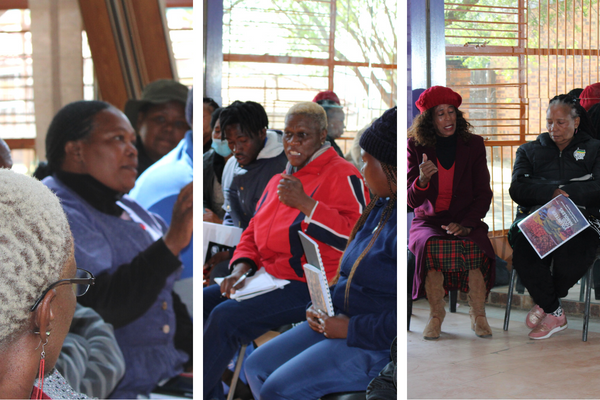
Care work and the volunteer food handler
At the stakeholder dialogue, one community member said, “when you cook with love, one can taste it in the food you make”. There was a general expectation that volunteer food handlers should go beyond their call of duty and perform their duties as an extension of care work. There seems to be a discrepancy in how the community sees women’s roles when it comes to doing care work in institutional spaces. On the one hand, they see caregiving and food preparation as inherent to a woman’s role and assume it to be a given skill. However, this narrative changes when women take on institutionalised cooking roles such as that of volunteer food handlers, which is also seen as somewhat specialised and in need of training. Food handlers are expected to wear two hats: mothers who “cook with love” and trained workers with sophisticated cooking skills. There seems to be a deep undervaluing of informal skills that women food handlers possess and an over-valuing of the skills they believe they are expected to have in order to cook “good food”.
VIDEO: A day in the life of a Volunteer Food Handler
Experience a day in the life of Khuli Gumede, a Volunteer Food Handler, as she goes about her daily routine. As we delve into Khuli’s journey, we uncover the realities faced by these remarkable individuals with multifaceted lives beyond their role preparing and serving food in schools across South Africa.
But what constitutes good and nutritious food?
The community’s idea of tasty food concerning the NSNP requires that the food served to children should be augmented to include things like salt, sugar, spices, tomatoes, packet soups and meat. Stakeholders felt that the existing menu, including foods such as soya mince, vegetables, samp, pap and canned fish, was lacking. However, one stakeholder expressed that the community over-emphasises taste, saying, “people are more focused on taste than health.”
One example of this was the stakeholder’s belief that VFHs should remove bones from canned pilchards to make them more edible. But the NSNP menu was designed to produce highly nutritious food sustainably, necessitating pilchard bones are highly nutritious and filled with omega-3, a critical ingredient for childhood cognitive development. Some community members were aware of this. They believed that good food is nutritious, further asserting that the traditional food grew up eating was an articulation of good food. “As African people, we see other people’s ways of preparing food as better than our own ways. This needs to change.”
The stakeholders recognised the direct relationship between food and personal health. “I went to see a doctor recently, and she told me that medication fights 30% of the battle when it comes to illnesses like arthritis and high blood pressure, while our diet fights the rest”, said one stakeholder, adding that “what we put into our bodies matters. People assume that I’m dieting to stay slim, but it’s more to avoid a stroke.”
Healthy nutrition is a critical yet often misunderstood concept in society. Due to rapid industrialisation and urbanisation, there is a significant amount of processed food with little to no nutritional value. A programme like the NSNP ensures that children have access to balanced and nutritious meals. Volunteer food handlers carry out their duties as per the NSNP’s stipulated guidelines. Fundamentally, there seemed to be a relationship between the misconception of healthy nutrition and the negative perception of volunteer food handlers in the community’s imagination.
There is an unmistakable relationship between the food we eat and how it makes us feel. Food also shapes our memories and how we shape our perceptions of places, people and the world around us as adults. As children, we are brought up eating food prepared by our parents and grandparents, who influence what we perceive to be nutritious, delicious and comforting. According to Time Magazine, the memories we have of the food we grew up eating are often comforting because of their connection to the relationships we associate with them. When asked what their favourite food growing up was, the community stakeholder’s faces lit up while describing umngqusho (samp and beans) or bogobe ba ting ea mabele (sour porridge) grandmothers, mothers or other caregivers prepared while they were growing up. Furthermore, they reminisced about how simple, fresh, healthy and delicious the food from their childhood was, appreciating that it was mostly without frills. The stakeholders connected on their shared value of traditional food, nutrition and health “even within our culture, we can find good things that are linked to nutrition and run with them.
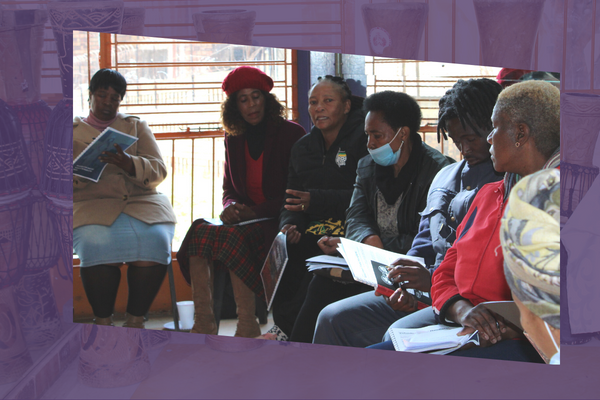
What can the community do to support food handlers and promote healthy nutrition in society?
The stakeholders heard stories from former and current food handlers about their experience as workers in the programme. A former volunteer food handler who was present shifted the conversation at a ‘heart level’, mentioning her experience of being a volunteer food handler as having been traumatic and riddled with oppression. Another volunteer food handler, currently working as a food handler, was present and expressed a similar dissatisfaction with the role of volunteer food handler while being the new mother of a tiny baby. Hearing the personal accounts of food handlers at the dialogue gave a human face to the role of a volunteer food handler and a contextual understanding of their working conditions. The stakeholders began to understand the role of volunteer food handlers in the NSNP and suggested ways in which they could support them. “We have a newfound appreciation for food handlers. Everyone has an important role to play and a special skill to play it. From what we can see, you are skilled, and you do what you do with love”, one stakeholder shared.
At a Feet level, former and current teachers can lead the conversation on traditional nutrition and Volunteer Food Handlers. “I am an ex-teacher, and I used to be responsible for food handlers at my school. What I have learned today is that there is so much improvement in what was happening in the past. Children and parents are starting to learn about healthy food. We must return to basics and appreciate the skills of our grandmothers in teaching us how to eat. Let us educate the community to stop taking excessive salt.”
Community members can help promote the recognition of food handlers as essential workers in their communities. “I did not know about volunteer food handlers. They seem to be dedicated and passionate about cooking for children. I feel that their working conditions should be improved.”
Community members can raise awareness around the need for society to value volunteer food handlers and recognise their impact beyond school kitchens. “I honour food handlers because they don’t only feed our children, but they also influence the way their own families eat. I would like them to extend this education to the community. They should be proud of the work they do, and we should treat them with love.”
“ The term Volunteer Food Handler is important. The work they do is essential, and they should be shown appreciation and compensated better for their skill and should form part of the national budget.
Furthermore, community members can also promote healthy nutrition by practising it in their homes.
“Hearing directly from food handlers was pivotal. We want to raise awareness around volunteer food handlers and the importance of nutrition in our families and communities. The conversation should continue in other areas so more people can know.” – Zodwa Madiba (Soweto Electricity Crisis Committee)
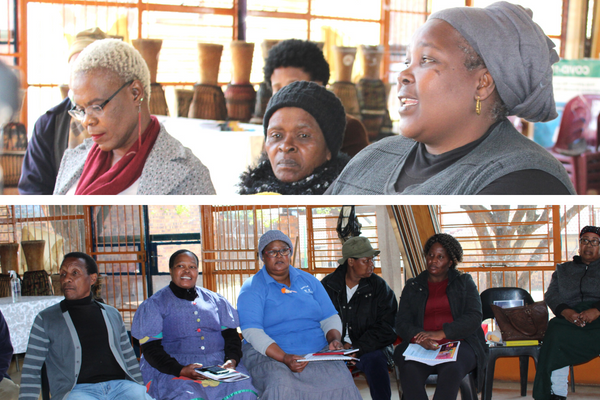
NGOs can lead the conversation with civil society around the societal and environmental impact of the devaluation of traditional food in families and communities.
“I work with a lot of communities in different provinces on environmental issues. I will implement what I have learned about food handlers and the NSNP wherever I go.” – Sibongile Ndlovu (At Life Africa, Johannesburg)
“We will add the issue of food handlers to our meeting agenda so that it will be easier for us to reach out to the greater community about food handlers.” – Zodwa Madiba (Soweto Electricity Crisis Committee)
Stakeholders can help capture and change the narrative of food handlers to highlight the positive elements of their role as women, workers, mothers and educators in society.
“I knew about the food handlers before but had a negative view of them because of assumptions and stories I’ve heard. But I have learned that we need to give them a chance because they face many challenges as women.” – Sibongile Ndlovu (At Life Africa, Johannesburg)
“I think they should be given permanent positions in the schools they are working in because the contract system offers them no consistency.” – Sibongile Ndlovu (At Life Africa, Johannesburg)
Parents can take on a more active role in advancing healthy nutrition at the home level, which would support food handlers in their efforts.“ As a woman, I believe that we can do a lot, and I see how important food handlers are. As parents, we should also play a role in our children’s nutrition to support the food handlers.”
Power Up Nutrition Series
